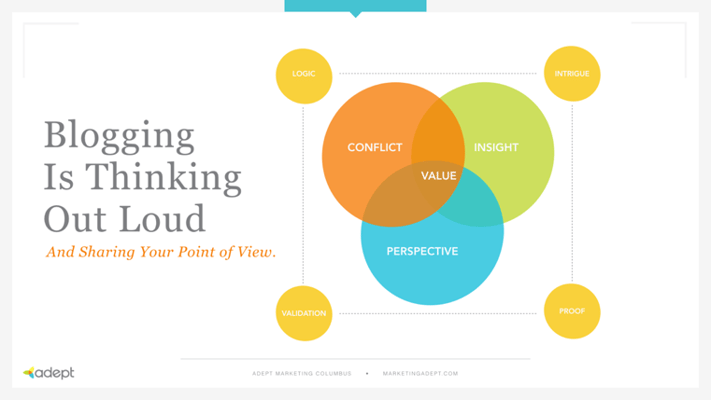4 Questions to Ask Before Writing that Next Blog Post

Blogging is about quality, not quantity. And you, the business leader, are more qualified than anyone else to create the meaningful content that will drive leads for your business. Here are 4 questions to help you get started.
At Adept, we are getting aggressive with our own blog. We’re unleashing our team to write without restriction – about the things they care about, in the channels and disciplines they deal with day in and day out.
The “why” is pretty apparent:
- B2B companies that blog generate 67% more leads per month than those who don’t blog (source)
- Interesting content is a top 3 reason why people follow brands on social media (source)
- Of consumers who said they have a relationship with a brand, 64% cited shared values as the primary reason (source)
These stats all sound convincing, sure. And most business leaders jump at the chance to increase leads, gain followers, and build brand loyalty with their customers.
But the thing about blogging is, it’s not just about blogging.
It’s about saying meaningful, helpful, relevant things consistently. You may write a hundred blog posts and never get a single customer from those posts if your content is inconsistent, bland, or uninteresting. And this is the rub with many business leaders who try their hand at writing blogs for their company’s website.
Blogging Is About Quality, Not Quantity
Hands down, the biggest (and most vocal) response I get when telling business leaders that they need to work blogging in as a part of their routine schedule is this:
“But, I’m not a writer.”
That may be true, but that doesn’t mean that you can’t blog. Because blogging isn’t about being a writer. It’s about being a leader. (tweet this) Blogging is thinking out loud and sharing your point of view with people who are asking the same questions that you’re asking, or who are trying to solve the same problems that you’re trying to solve.
I believe that many business leaders struggle with creating content, not because they can’t write about a subject, but because they believe a myth that they can’t create interesting, quality content that will get noticed.
So, What Makes a “Quality” Blog?
Sure, “quality” is a subjective term when it comes to blogging. But, successful blogs (i.e., blogs that get shared, generate comments, earn links, and get ranked) are blogs that articulate a conflict, provide an insight or solution, and give perspective.

And, every leader knows how to do that.
So I’m on a bit of a personal mission to help everyone realize the value they can contribute to the blog. I believe that we all have what it takes to create meaningful content—it’s just a matter of finding the right process and format that works for each individual.
Here’s the process that I use personally to create meaningful blogs—both professionally for the blogs I write, and personally for my own content. These are the four questions I ask before I ever type (or write) a word.
Question 1: What problem do I want to solve? (conflict)
The biggest battle that most people face when writing a blog is figuring out what to write about. I know people who’ll spend 3 hours just trying to “find an idea” before they even start typing words on a screen.
That’s unsustainable chaos, in my opinion.
“What should I write about?” is the wrong question to ask when determining what you’ll write about. The right question to ask is “What specific problem do I want to solve?” It’s way easier to brainstorm problems than it is to pull inspirational topics out of thin air.
I refer to this stage as conflict—and I believe it’s absolutely the most critical factor to determining the relevance (or forgetfulness) of a blog post because, odds are, someone else is having that same problem and searching for answers. Articulated conflict is the secret sauce of every great individual blog post.
Rather than spending hours trying to “come up with an interesting idea,” keep track of problems you encounter consistently. I keep an Evernote folder for ideation like this. Anytime I notice a problem in our content process, or a hear a misunderstanding of the role or execution of content, or see something that could improve our content assets, I log a quick note. These are often great blog posts in hiding.
Question 2: Why do I care about this? (perspective)
This may seem a bit obvious, but you’d be surprised how frequently people write about subjects or ideas that they don’t care about. The takeaway is pretty simple—if you don’t care about what you’re writing, no one else will.
Align yourself emotionally with your content. Why do you care about solving this problem? How will solving this problem, or offering your perspective, benefit your readers? I recommend taking the time to actually write that down; it’ll keep you on track when you don’t feel “inspired” to create the actual content.
If you don’t care about the problem, or can’t find the emotional allegiance to solving it, it’s time to move on to another topic. Champion things you care about; be silent on the things that bore you.
Question 3: What’s the one point that I want to make about this topic? (insight)
Michael Scott, of Dunder Mifflin infamy, once said, “Sometimes I’ll start a sentence and I don’t even know where it’s going. I just hope to find it along the way.” I think a lot of people do that when they sit down to write a blog.

Spend time, before you write your post, crafting and fine-tuning the one thing that you want your readers to take away from your content. Write it down. Say it out loud. Obsess over it. Think of this one idea as the big X on the map of your blog post. Without it, your content will wander and quickly get lost.
Identify your point up front and put it in laser focus. Work it into the title of your post. State it outright it in your introduction. And spend the rest of your post proving your point with details.
Question 4: Will anyone care about this? If not, should they? (value)
This is the gut-check stage. After running an initial idea through the first four steps, it’s time to evaluate the strength or value of an idea before you start writing.
For example, with this post, I asked myself “will my advice on blogging really help anyone?” My theory is that yes—lots of business leaders struggle with creating content, not because they can’t write about a subject, but because they believe a myth that they can’t create interesting content that will get noticed.
I hope I’ve planted a seed of doubt about that myth in your mind.
Go Forth And Lead (Create)
Blogging is hard, important, valuable work. Yes, creating great content consistently takes time, intention, and a substantial amount of gut-checking. Yes, it will drive returns for your business.
And you are absolutely qualified to do it.
